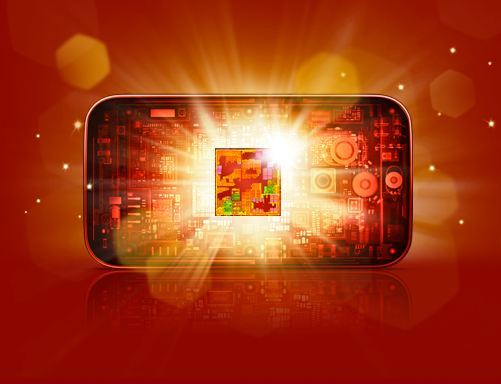Qualcomm announces new Snapdragon chips that are fast as hell


As expected, mobile hardware and component companies are pouring out the new gear announcements at CES. And not to be missed is the new chips in the pipe from Qualcomm. Dubbed the Snapdragon 600 and Snapdragon 800, on paper it looks like they will knock our socks off.
First out of the gate will be the 600 series, expected in commercial devices in the middle of this year. Take the S4 Pro that's in the Nexus 4 or DNA, and make everything better and you are on the right track. The 600 will feature:
- Quad Core Krait 300 CPU at speeds up to 1.9 GHz per core
- Adreno 320 GPU
- LPDDR3 RAM support
- Up to 40-percent better performance than the Snapdragon S4 Pro processor
Now remember, we will see this one in devices this summer, not sometime next year. And being 40-percent faster than the Nexus 4 in my pocket means the device is going to be a monster. Once you process this one (pardon the pun) you have the 800 to think about. Take the 600 you're drooling over, and take everything up to 11. It features:
- Quad Core Krait 400 CPU at speeds up to 2.3 GHz, per core
- Adreno 330 GPU
- 2x32bit LPDDR3 RAM at 800MHz
- 4G LTE Cat 4 and 802.11ac support
- UltraHD resolution support (4096 × 2304)
- Support for DTS-HD, Dolby Digital Plus and 7.1 surround sound
- Dual Image Signal Processors (ISPs) up to 55MP
- Up to 75% better performance than the Snapdragon S4 Pro
It's hard to imagine how all this is going to translate into real world use. Numbers on paper excite some folks, and these are sure to get some impressive numbers. But this much more raw power will be noticeable in everyday usage as well. It's also said to be available in commercial devices in mid 2013.
And we can't wait to see it. Hit the break to read the press release.
Qualcomm Announces Next Generation Snapdragon Premium Mobile Processors
New Snapdragon 800 and 600 Processors Represent a Significant Performance Leap For High-End Mobile Computing Devices
LAS VEGAS, Jan. 7, 2013/PRNewswire-FirstCall/ -- Qualcomm Incorporated (NASDAQ: QCOM) today announced that its wholly owned subsidiary, Qualcomm Technologies, Inc., is sampling the first products in its latest generation of processors. With the introduction of its newest Qualcomm Snapdragon™ 800 and 600 processors, Qualcomm continues to lead the industry by once again raising the bar on performance per watt and delivering unparalleled user experiences.
Get the latest news from Android Central, your trusted companion in the world of Android
The new Qualcomm Snapdragon 800 processors target premium mobile and computing devices. They are designed to deliver outstanding overall user experience, expand the possibilities of seamless connected computing and enable brand new mobile experiences while maintaining industry-leading battery performance:
Visually stunning mobile experiences : Qualcomm Snapdragon 800 processors include the new quad core Krait 400 CPU, Adreno™ 330 GPU, Hexagon v5 DSP and our latest 4G LTE Cat 4 modem and deliver increased system performance and platform upgrades that further enhance user experience.
- The Qualcomm Snapdragon 800 processors will deliver up to 75 percent better performance than the Qualcomm Snapdragon S4 Pro processor and the move to 28nm High Performance for mobile (HPm) technology node ensures exceptionally low power
- New Krait 400 CPU in quad configuration, with speeds of up to 2.3 GHz per core offers best-in-class performance per watt, so processor performance can hold up to the more demanding processing and communication requirements of premium mobile devices
- Additionally, asynchronous SMP architecture provides dynamic power sensing and control for peak performance per core, while extending battery life without the use of specialized cores
- New Adreno 330 GPU delivers more than 2x performance for compute applications over the current Adreno 320 GPU
- 2x32bit LP-DDR3 at 800MHz with industry-leading memory bandwidth of 12.8GBps
- New Hexagon DSP V5 delivers floating point support, dynamic multithreading and expanded multimedia instructions for enhanced low power performance
- New IZat ™ location technology combines multiple tracking systems into a single high performance, highly accurate navigation platform for auto and pedestrian applications
Seamless communications anytime, anywhere : Qualcomm Snapdragon 800 processors offer fully integrated connectivity and a wide variety of communication options.
- Third generation 4G LTE modem with data rates up to 150 Mbps (Category 4), fully integrated in the new Qualcomm Snapdragon 800 processors
- 4G LTE Advanced Carrier Aggregation feature to maximize radio frequency bandwidth
- World multimode and multi-band support using wafer level package (WTR1605)
- Integrated newest generation mobile Wi-Fi connectivity, 802.11ac
- Broad connectivity support with integrated USB 3.0, Bluetooth and FM
Breakthrough multimedia experiences : The Qualcomm Snapdragon 800 processors also introduce the very latest mobile experiences.
- Capture, playback and display in UltraHD video (with four times 1080p pixel density)
- Dual Image Signal Processors (ISP) for Qualcomm Snapdragon Camera with support for computational camera
- HD multichannel audio with DTS-HD and Dolby Digital Plus for enhanced audio
- Higher display resolutions (up to 2560x2048) and Miracast 1080p HD support
The Qualcomm Snapdragon 800 processors are currently sampling and expected to be available in commercial devices by mid-year 2013.
The Qualcomm Snapdragon 600 processor targets high-end mobile devices. The Qualcomm Snapdragon 600 processor is designed to deliver great performance, rich graphics and enhanced user experience and will deliver up to 40 percent better performance than the Qualcomm Snapdragon S4 Pro processor at lower power. The new processor offers system-wide architectural improvements, key component upgrades and expanded connectivity options. The Qualcomm Snapdragon 600 processor features a new Krait 300 quad-core CPU with speeds up to 1.9GHz, a new speed enhanced Adreno 320 GPU and support for LPDDR3 memory. The Qualcomm Snapdragon 600 processor is sampling now and is expected to be available in commercial devices by second quarter 2013.
"With the overwhelming success of our previous Qualcomm Snapdragon platforms, our mobile processors have emerged as the platform of choice for high-end mobile devices," said Steve Mollenkopf, president and chief operating officer of Qualcomm. "With more than 50 design wins already secured with the first products of the Qualcomm Snapdragon 600 and 800 processors, we are advancing our vision and setting the standard for excellence in mobile computing."
For more information and to see a demonstration of the Qualcomm Snapdragon 800 processors, as well as the newest devices powered by Qualcomm Snapdragon processors, please visit Qualcomm during CES 2013 (South Hall 3, Upper Level, Booth #30313), Jan. 8-11 in Las Vegas or visit www.qualcomm.com/snapdragon .
About Qualcomm Incorporated
Qualcomm Incorporated (NASDAQ: QCOM) is the world leader in 3G, 4G and next-generation wireless technologies. Qualcomm Incorporated includes Qualcomm's licensing business, QTL, and the vast majority of its patent portfolio. Qualcomm Technologies, Inc., a wholly-owned subsidiary of Qualcomm Incorporated, operates, along with its subsidiaries, substantially all of Qualcomm's engineering, research and development functions, and substantially all of its products and services businesses, including its semiconductor business, QCT. For more than 25 years, Qualcomm ideas and inventions have driven the evolution of digital communications, linking people everywhere more closely to information, entertainment and each other. For more information, visit Qualcomm's website , OnQ blog , Twitter and Facebook pages.
Except for the historical information contained herein, this news release contains forward-looking statements that are subject to risks and uncertainties, including the Company's ability to successfully design and have manufactured significant quantities of Qualcomm Snapdragon 600 and Snapdragon 800 processors on a timely and profitable basis, the extent and speed to which the Snapdragon platform is adopted, change in economic conditions of the various markets the Company serves, as well as the other risks detailed from time to time in the Company's SEC reports, including the report on Form 10-K for the year ended September 30, 2012, and most recent Form 10-Q.
Qualcomm, Adreno and Snapdragon are trademarks of Qualcomm Incorporated, registered in the United States and other countries. All Qualcomm Incorporated trademarks are used with permission. Other products or brand names may be trademarks or registered trademarks of their respective owners.

Jerry is an amateur woodworker and struggling shade tree mechanic. There's nothing he can't take apart, but many things he can't reassemble. You'll find him writing and speaking his loud opinion on Android Central and occasionally on Threads.
